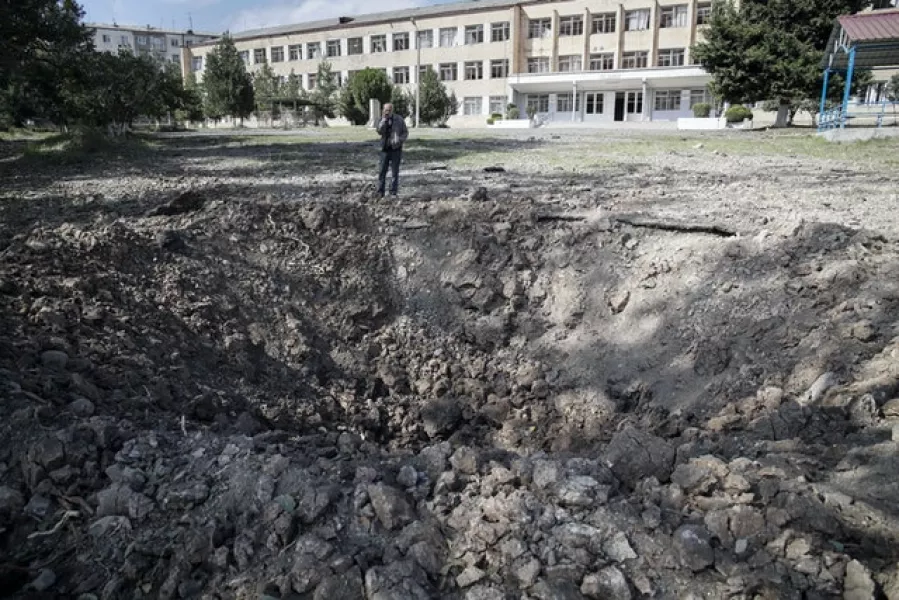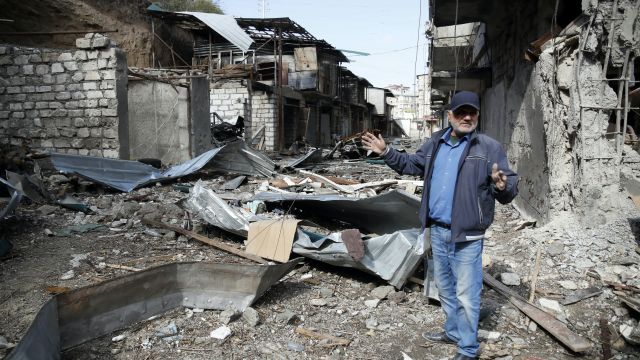The two sides traded blame for breaking the truce that took effect at noon (0800 GMT) with new attacks, and Azerbaijan’s top diplomat said the truce never entered force.
The ceasefire announcement came overnight after 10 hours of talks in Moscow sponsored by Russian foreign minister Sergey Lavrov.
The deal stipulated that the ceasefire should pave the way for talks on settling the conflict.

If the truce holds, it would mark a major diplomatic coup for Russia, which has a security pact with Armenia but also cultivated warm ties with Azerbaijan.
But the agreement was immediately challenged by mutual claims of violations.
Minutes after the truce took force, the Armenian military accused Azerbaijan of shelling the area near the town of Kapan in southeastern Armenia, killing one civilian.
Azerbaijan’s Defence Ministry rejected the Armenian accusations as a “provocation”.
The Azerbaijani military, in turn, accused Armenia of striking the Terter and Agdam regions of Azerbaijan with missiles and then attempting to launch offensives in the Agdere-Terter and the Fizuli-Jabrail areas.

Azerbaijan’s foreign minister Jeyhun Bayramov charged that “conditions for implementing the humanitarian ceasefire are currently missing” amid the continuing Armenian shelling.
Armenia’s Defence Ministry denied any truce violations by the Armenian forces.
The latest outburst of fighting between Azerbaijani and Armenian forces began on September 27 and left hundreds of people dead in the biggest escalation of the decades-old conflict over Nagorno-Karabakh since a separatist war there ended in 1994.
The region lies in Azerbaijan but has been under control of ethnic Armenian forces backed by Armenia.
Since the start of the latest fighting, Armenia said it was open to a ceasefire, while Azerbaijan insisted that it should be conditional on the Armenian forces’ withdrawal from Nagorno-Karabakh, arguing that the failure of international efforts to negotiate a political settlement left it no other choice but to resort to force.
The foreign ministers of Armenia and Azerbaijan signed the truce in Moscow after Russian President Vladimir Putin had brokered it in a series of calls with President Ilham Aliyev of Azerbaijan and Armenia’s Prime Minister Nikol Pashinian.
Russia has co-sponsored peace talks on Nagorno-Karabakh together with the United States and France as co-chairs of the so-called Minsk Group, which is working under the auspices of the Organisation for Security and Cooperation in Europe.
They have not produced any deal, leaving Azerbaijan increasingly exasperated.
Speaking in an address to the nation on Friday hours before the ceasefire deal was reached, the Azerbaijani president insisted on his country’s right to reclaim its territory by force after nearly three decades of international talks that “haven’t yielded an inch of progress”.
Fighting with heavy artillery, warplanes and drones has engulfed Nagorno-Karabakh, with both sides accusing each other of targeting residential areas and civilian infrastructure.
According to the Nagorno-Karabakh military, 404 of its servicemen have been killed since September 27.
Azerbaijan has not provided details on its military losses. Scores of civilians on both sides also have been killed.







